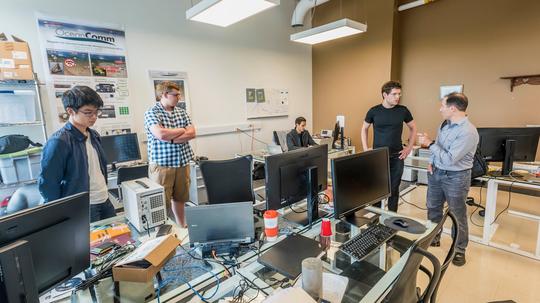
A few days ago NASA announced a ceremonious discovery of seven Earth-sized planets orbiting a dwarf star that could potentially support life, and understandably this got a lot of people in the scientific community very excited. But while continued space exploration and the search for extraterrestrial life remain worthy goals to pursue, there’s something much closer and comparatively more accessible to us, which remains woefully unexplored -- our oceans.
The sheer scale of a natural resource covering 77 percent of the Earth’s surface presents a tremendous opportunity for technology to not only reveal answers about life in the water, but also for undersea robotics, oil and gas exploration as well as deep sea mining for natural resources. However, in the absence of wireless technology, underwater robots that can perform this kind of exploration have to be tethered to what are known as “support ships” for communication, with operations -- including cost of crew and manpower -- costing upwards of $120,000 per day.
Now, OceanComm, a startup at the University of Illinois at Urbana-Champaign (UIUC), has created a wireless underwater modem that unleashes robots from its cables and eliminates dependency on support ships. OceanComm’s modem not only dramatically brings down that cost, but can communicate data with faster speeds and more efficiency than ever seen before.
The initial challenge for the team was to work with seawater, which absorbs radio waves very effectively and thus renders traditional inland broadband communication techniques ineffective. To address this, OceanComm developed WiFi “nodes” that use ultrasound (similar to how whales and dolphins communicate) to wirelessly transmit data at broadband speeds.
OceanComm's technology also dynamically measures, tracks, and compensates for the Doppler distortion, a physical phenomena that wreaks havoc on acoustic signals caused due to the speed of sound being five orders of magnitude slower than the speed of radio wave propagation. It enables human operators to monitor operations in real-time and take full control whenever needed -- thus reducing dependence on AI to correct operations gone awry.
While existing wireless underwater modems can transfer ~1picture/min, OceanComm’s nodes, housed in titanium, can communicate data up to 1000 times faster and can also livestream video.
While existing wireless underwater modems can transfer ~1picture/min, OceanComm’s nodes, housed in titanium, can communicate data up to 1000 times faster and can also livestream video. The nodes have been tested to work in turbid water, do not require tethered links to ships and can live-stream video at speeds of greater than 1Mpbs for depths reaching five miles. At a time of extremely volatile oil prices, OceanComm positions itself as a viable, cost-saving alternative.
Originally from Germany, co-founder Thomas Riedl was a PhD student in electrical engineering at UIUC investigating existing barriers to faster underwater wireless communication under professor Andrew Singer, a leading researcher in this subject. Even before his graduation, Riedl was encouraged to think about this as a business opportunity after a class on venture funding and with the support of his research advisor, who is also the director of UIUC’s Technology Entrepreneur Center.
Winning the Cozad New Venture Challenge came next in 2012, to which Riedl attributes a lot of his early confidence in pursuing the endeavor. The company then participated in the National Science Foundation’s I-Corps program in 2013, where they learned to apply lean thinking, and conducted around three hundred interviews with potential customers (including the CEO of a major regional gas company) to test viability and market fit.
After Riedl’s graduation from the PhD program in 2014, OceanComm successfully applied for and received two SBIR grants totaling almost a million dollars in seed funding. In 2015, the company received the “most promising company award” at the Offshore Technology Conference (OTC) in Houston, the world's largest oil and gas trade show. While they declined to share specifics about their recently awarded US Navy contracts, Riedl had a contagious enthusiasm in pointing out the potential for underwater drones, currently an extremely nascent concept.
OceanComm’s team of nine is almost entirely engineers at this point, with one person coordinating new business development. Even though he has graduated, Riedl says he chooses to work out of the Enterprise Works incubator at the University of Illinois Research Park primarily because of the access to this engineering talent (either UI alum or current students working as co-ops) as well as deep faculty expertise in signal processing, machine learning, circuits and power electronics.
When asked about challenges they face, Riedl expressed a commonplace sentiment among entrepreneurs working on futuristic technology. "For some of our work we depend on others (think ocean testing with large vessels or customer support for certain microchips) and there are lead times that are hard to bring down," he said. Still, OceanComm is looking to keep building on their momentum this year. They hope to launch their wireless modem by fall after continued deepwater testing with integration partners. Riedl also added that they are looking to hire at least two more electrical engineers in the next few months, and with two large governments contracts they will likely not need any additional funding this year.
As the great nature documentary filmmaker Sir David Attenborough once said, “An understanding of the natural world and what's in it is a source of not only a great curiosity but great fulfillment.” Now, with technology like OceamComm's, we could be one step closer towards better understanding what’s out there.
Note: An earlier version of this article misspelled the entrepreneur's last name. The error is very sincerely regretted.








